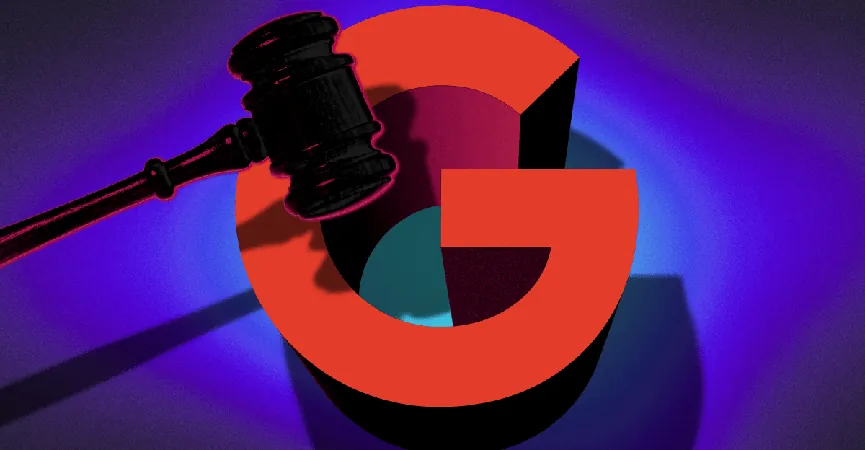
Google Faces Existential Threat: Breaking Up the Tech Giant Could Be Imminent!
2025-04-19
Author: Amelia
In a dramatic turn of events, Google is under siege like never before! After five grueling years protecting its digital empire, the tech titan's defenses are crumbling. The stakes are sky-high as the U.S. Department of Justice (DOJ) gears up for a battle that could completely transform Google’s business model and open doors for fierce competition.
Last year, a federal judge ruled that Google holds an illegal monopoly in the online search arena, and just this week, another judge declared its dominance in the ad tech sector equally unlawful. All eyes are now fixed on Washington, D.C., where a critical three-week trial kicks off Monday. This trial will explore remedies aimed at reinstating competition in the online search market.
Despite Google's vow to appeal both of these rulings, they must first navigate through the remedies trials—giving the DOJ a platform to argue for a split-up of the company along with implementing other restrictions. The government will aim to compel Google to divest its Chrome web browser, share critical search data with competitors, disclose new AI investments, and ditch its exclusivity deals with phone and browser manufacturers.
The antitrust scrutiny Google is facing is unprecedented for a major tech player in the U.S., reminiscent of Microsoft's massive legal challenges over its PC operating system monopoly a quarter-century ago.
While Google has faced fines and made changes to appease international regulators, these setbacks pale in comparison to the heavy-handed measures the DOJ is pursuing. If successful, the DOJ's efforts might severely damage Google's lucrative partnership with Apple, giving rivals like Microsoft a chance to tap into Google's treasure trove of data.
During the initial liability phase of the antitrust trials, Google defended its position vigorously, claiming it won over users with superior products. However, as it enters this next phase, it will confront judges who have already determined that its practices were unfair. Google now must merely advocate for lighter penalties.
The DOJ's argument hinges on breaking Google’s search monopoly, pointing to exclusive deals with Apple that create significant barriers for competition. Owning Chrome gives Google control over a major entry point to search engines, effectively shielding its market position and securing vast amounts of user data that competitors simply cannot access.
An essential aspect of the DOJ's case is ensuring any sanctions are future-proof, preventing Google from re-establishing monopoly control, especially in the burgeoning field of AI. While they opted not to pursue the sale of Google’s AI investments, the government still aims to require the company to report future investments in this arena.
Google executives will take the stand alongside competitors like DuckDuckGo and Microsoft’s Bing, along with AI leaders from OpenAI. This time, instead of just assessing whether Google acted anti-competitively, testimonies will be used to underscore the necessity of the proposed remedies—while Google counters that these fixes could disrupt the platforms consumers love.
Meanwhile, in the ad tech case, proceedings are still in preliminary stages, presided over by Judge Leonie Brinkema. She's already indicated the DOJ's claims that Google's intertwined services—specifically its publisher ad server DFP and the AdX exchange—are monopolistic.
Though proposals here might seem less dramatic than forcing a Chrome spin-off, changes in Google's ad technology could underpin much of the internet economy, allowing publishers to thrive outside major social media networks.
What's next in this high-stakes game? Expect a ruling on search remedies possibly by summer's end. As for the ad tech case, speed is of the essence; Judge Brinkema's court is recognized for its rapid resolutions. However, Google could delay any changes through appeals, setting the stage for a prolonged legal battle that may even reach the Supreme Court!
Historically, significant outcomes in antitrust cases haven't always led to breakups, as seen in Microsoft’s scenario. Still, even milder remedies can open the door for innovative challengers to emerge in the tech space—one of which has been Google itself!









 Brasil (PT)
Brasil (PT)
 Canada (EN)
Canada (EN)
 Chile (ES)
Chile (ES)
 Česko (CS)
Česko (CS)
 대한민국 (KO)
대한민국 (KO)
 España (ES)
España (ES)
 France (FR)
France (FR)
 Hong Kong (EN)
Hong Kong (EN)
 Italia (IT)
Italia (IT)
 日本 (JA)
日本 (JA)
 Magyarország (HU)
Magyarország (HU)
 Norge (NO)
Norge (NO)
 Polska (PL)
Polska (PL)
 Schweiz (DE)
Schweiz (DE)
 Singapore (EN)
Singapore (EN)
 Sverige (SV)
Sverige (SV)
 Suomi (FI)
Suomi (FI)
 Türkiye (TR)
Türkiye (TR)
 الإمارات العربية المتحدة (AR)
الإمارات العربية المتحدة (AR)